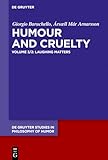Humour and Cruelty. Volume 3, Laughing Matters ; Theses and Discussions / Giorgio Baruchello, Ársæll Már Arnarsson.
Material type: TextSeries: De Gruyter Studies in Philosophy of Humor ; 3/2Publisher: Berlin ; Boston : De Gruyter, [2023]Copyright date: ©2024Description: 1 online resource (XII, 416 p.)Content type:
TextSeries: De Gruyter Studies in Philosophy of Humor ; 3/2Publisher: Berlin ; Boston : De Gruyter, [2023]Copyright date: ©2024Description: 1 online resource (XII, 416 p.)Content type: - 9783111254555
- 9783111256573
- 9783111256108
- 820.8 23
- PR1109 .B378 2024
- online - DeGruyter
- Issued also in print.
| Item type | Current library | Call number | URL | Status | Notes | Barcode | |
|---|---|---|---|---|---|---|---|
 eBook
eBook
|
Biblioteca "Angelicum" Pont. Univ. S.Tommaso d'Aquino Nuvola online | online - DeGruyter (Browse shelf(Opens below)) | Online access | Not for loan (Accesso limitato) | Accesso per gli utenti autorizzati / Access for authorized users | (dgr)9783111256108 |
Frontmatter -- Acknowledgments -- Contents -- Brief Remarks on Part 2 of Volume 3 -- 1 Cruelty Against Humour -- 2 Humour Against Cruelty -- 3 Concluding Remarks -- Bibliography -- Index
restricted access online access with authorization star
http://purl.org/coar/access_right/c_16ec
Part 2 of Volume 3 addresses in detail the conflicts between humor and cruelty, i.e., how cruelty can be unleashed against humor and, conversely, humor can be utilized against cruelty. Potent enmities to mirth and jollity are retrieved from a variety of socio-historical contexts, ranging from Europe’s medieval monasteries to the 2015 Charlie Hebdo massacre. Special attention is paid to the cruel humor and humorous cruelty arising thereof, insofar as such phenomena can reveal critical aspects of today’s neoliberal socio-economic order. In parallel, settings where humor has been used as an instrument to cope with suffered cruelty, whether natural or human in origin, are also retrieved and discussed. These also vary greatly and encompass domains such as hospital wards, 20th-century Jewish ghettoes, and contemporary funeral homes. A set of concluding reflections is then offered on the psychological, theological, ethical, and metaphysical roots of humor—and its cruel rejection. "Like Aristotle and Dewey, Arnarsson and Baruchello do not define their terms at the outset, but instead they relentlessly pursue the meanings of two ordinary words that everyone vaguely understads to arrive at a critical insight into the concepts these words represent, which are both disparate and interrelated." - Richard Marc Rubin, President, George Santayana Society
Issued also in print.
Mode of access: Internet via World Wide Web.
In English.
Description based on online resource; title from PDF title page (publisher's Web site, viewed 06. Mrz 2024)


